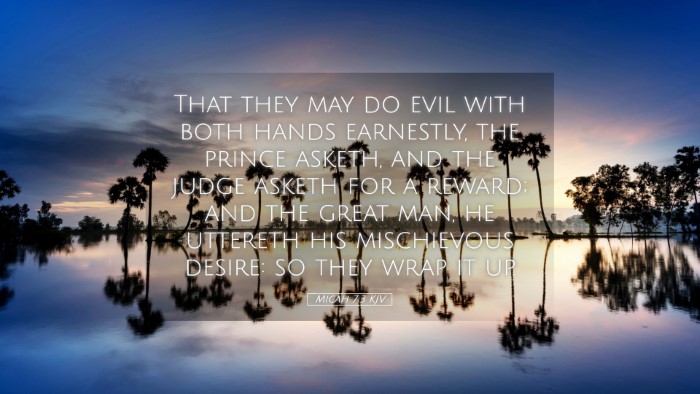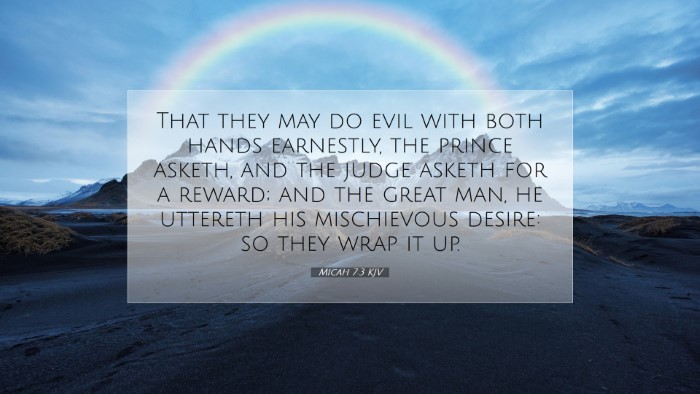Old Testament
Genesis Exodus Leviticus Numbers Deuteronomy Joshua Judges Ruth 1 Samuel 2 Samuel 1 Kings 2 Kings 1 Chronicles 2 Chronicles Ezra Nehemiah Esther Job Psalms Proverbs Ecclesiastes Song of Solomon Isaiah Jeremiah Lamentations Ezekiel Daniel Hosea Joel Amos Obadiah Jonah Micah Nahum Habakkuk Zephaniah Haggai Zechariah MalachiMicah 7:3
Micah 7:3 KJV
That they may do evil with both hands earnestly, the prince asketh, and the judge asketh for a reward; and the great man, he uttereth his mischievous desire: so they wrap it up.
Micah 7:3 Bible Commentary
Commentary on Micah 7:3
Micah 7:3 reads: "That they may do evil with both hands earnestly, the prince asketh, and the judge asketh for a reward; and the great man, he uttereth his mischievous desire: so they wrap it up." This verse is a profound observation of the corruption posed in leadership and societal structures during Micah's time, and it serves as a timeless reflection on moral decay that can resonate with various audiences including pastors, students, theologians, and scholars.
Contextual Analysis
The Book of Micah, situated among the Minor Prophets, offers a dramatic mirror to Israel's sins and the impending judgment of God. Micah prophesies during a tumultuous period where both Israel and Judah experience significant turmoil and moral decline. In this verse, Micah highlights the pervasive wickedness entrenched within the leadership and the societal fabric.
Exegesis of Key Terms
- “Do evil with both hands earnestly”: This phrase emphasizes a deliberate and intentional engagement in wrongdoing. The imagery suggests a total commitment to immorality.
- “The prince asketh, and the judge asketh for a reward”: Micah explicitly illustrates the collusion and moral compromise of leaders. Corruption is not hidden; it is expected in the judiciary and those in power.
- “The great man”: This denotes influential individuals who possess power and authority. Their influence is leveraged to perpetuate greed and manipulation.
- “wrap it up”: This phrase signifies secrecy and deception, indicating that these nefarious activities are often concealed under the guise of normalcy.
Theological Implications
The theological implications of Micah 7:3 are profound, as they delve into the nature of sin, justice, and societal responsibility. These themes resonate with the contemporary audience, challenging us to reflect on ethical behavior in leadership and governance.
- Ethics in Leadership: The verse is a clarion call for integrity among leaders. It urges those in power to abstain from corruption and to serve the community with righteousness.
- The Consequences of Sin: Micah illustrates the inevitable fallout of a society steeped in sin. Judgment is not only individual but communal, bringing forth a pervasive climate of distrust and moral failing.
- Deception and Secrecy: The call to action against hidden sins has enduring relevance. It reminds us that avoiding accountability leads to widespread disillusionment and societal decay.
Commentary Insights
Matthew Henry
Matthew Henry emphasizes the lamentable state of affairs depicted in Micah 7:3, underscoring that such moral failures among leaders reflect a broader spiritual crisis. He notes that they actively seek out opportunities for corruption, which sets a dangerous precedent for societal norms.
Albert Barnes
Albert Barnes expounds on the avarice of leaders suggesting that the actions of princes, judges, and the affluent signify a departure from justice. He elucidates that this verse serves as an indictment of all classes who foster corrupt practices, thereby heightening the urgency for divine intervention.
Adam Clarke
Adam Clarke meticulously explores the socio-political backdrop of the text, explicating how the intertwined relationship between power and corruption leads to systemic injustice. His analysis reveals that such behaviors erode public trust and compromise the foundational principles of governance.
Practical Applications
As we draw practical applications from Micah 7:3, different perspectives emerge for various audiences. Pastors, theologians, and students of the Bible are called to:
- Engage in Ethical Leadership: For church leaders, this serves as a personal admonition to embody integrity and transparency in their ministries.
- Promote Justice: The larger Church community must advocate for justice and righteousness in society, confronting corruption with courage and resilience.
- Educate on Accountability: Educational institutions should emphasize a curriculum focused on ethics, leadership, and the importance of a moral compass within the context of biblical teachings.
Conclusion
Micah 7:3 encapsulates a powerful indictment against corruption and moral decay in leadership. Its rich themes and vivid imagery invite pastors, students, theologians, and scholars to reflect deeply on their roles in promoting justice and righteousness, urging an examination of moral integrity in all spheres of life. As we contemplate the implications of this verse, let us commit ourselves to be beacons of light in a world often clouded by the shadows of greed and corruption.


